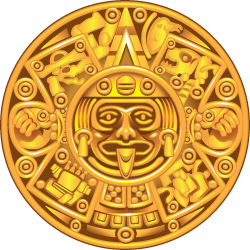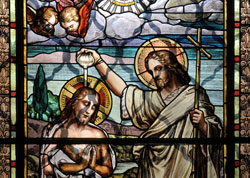Prepare
This week’s Gospel reading is brief and familiar, so looking back at Matthew’s opening chapters helps us see the context for Jesus’ baptism and the figures who prepared the way.
Matthew begins with a genealogy, reminding us that Jesus’ story is rooted in humble beginnings. Then we meet Joseph, who responds to angelic messages with courage—adopting Jesus, honoring his vow to Mary, and protecting the Holy Family from Herod’s wrath. Next comes the Magi, who defy Herod’s orders through civil disobedience, ensuring Jesus remains safe.
Finally, some years later, John the Baptist appears in the wilderness, preaching repentance and baptizing in the Jordan. Crowds gather—Jews and Gentiles alike—as John calls out injustice among both the royal family and religious leaders. Like the prophets before him, John points beyond himself to the One who is greater, preparing hearts for Christ’s arrival.
As many worshipping communities affirm baptismal promises on this Baptism of the Lord Sunday, these chapters remind us that even Jesus entered the waters with guidance and support. From the start, Matthew shows that discipleship is communal—woven through family, neighbors, and prophetic voices. Jesus’ life bears witness to this truth: we walk the journey of faith together, grounded in God’s promises and strengthened by one another.
Opening Exercise
Did you make a resolution this year? Maybe your resolution matches one of these most popular resolutions from a recent YouGov.com US poll.
- What immediate thoughts do you have about this list?
- How many of these most popular resolutions are personal or internally focused?
- How many are community-based or externally focused?
- What do you believe these resolutions say about our society or culture?
Texts to Read Aloud
Preparing the Way for New Things
A power couple in the ancient Roman pantheon, deities Janus and Jana were guardians of beginnings, transitions, and
doorways. They were often depicted with two faces—one older, looking backward, and the other younger, looking forward—symbolizing reflection on the past and anticipation of the future. This duality makes them central to the New Year, as January—the first month—is named after Janus. Since before Jesus’ time, people have embodied this double gaze at the start of a new year: looking back with wisdom and forward with hope. That perspective helps us read today’s Gospel, where something new happens at the Jordan River.Matthew’s brief account of Jesus’ baptism is a hinge moment. Jesus arrives from Galilee; John hesitates. Jesus insists. The waters receive him. The Spirit descends like a dove, and a voice from heaven declares, “This is my Son, the beloved.”
Why does Jesus insist on baptism? He does not need repentance like the others John baptized. Yet, Jesus chooses solidarity—stepping into our story to launch God’s new creation. As at Christmas, this is another incarnation moment. “To fulfill all righteousness” is not a checkbox; it’s a covenantal act—God joining humanity and opening a path forward. The Spirit’s descent and God’s voice make this a communal blessing: God’s life poured out for the world in a very public way for the first time in Matthew’s Gospel. This is not just an origin story for Jesus’ public ministry—it’s a sacramental reveal of God’s way in the world: relational, embodied, transformative.
Standing beside Jesus in the water is John—a trending wilderness prophet dressed in camel’s hair, eating locusts, and calling out the injustices perpetrated by kings and religious elites. John is popular—very popular. Crowds flock to him: Roman soldiers, Jews and Gentiles, rich and poor. He calls people back to covenant faithfulness, modeling a kind of fiery devotion to God and neighbor that is not dressed in fancy robes or crowns.
John could have refused to baptize Jesus because this was a new and different kind of baptism. He could have grown jealous or seen Jesus as a threat. He could have capitalized on or even monetized his wilderness fame. Instead, he uses his influence to spotlight Jesus. His viral quote: “He must increase, but I must decrease” (John 3:30). Instead of trying to gain more followers, John freely chooses to point many away from himself and loose his flock to Jesus’ care. That’s not just humility—it’s a countercultural resolution in a world obsessed with riches, followers, and fame. If John had a New Year’s resolution, it might read: “Less me, more Messiah.”
So what does this mean for our double gaze this January—looking back with wisdom and forward with hope? This new year and this holy day give us a chance to revisit our baptismal identity. It’s an opportunity to reaffirm our baptism daily and to let the promises made at baptism define this new year. It’s an invitation to posture ourselves like John in practicing prophetic hospitality—using your influence to point to Jesus in tangible ways for the good of creation or aligning more fully to what the Church is already doing, bringing justice to broken systems and communities.
Finally, may we stay open to the new things God may be doing in our life together, even if it causes a moment of hesitation, as we look to Jesus daily and follow after his ways in 2026.
Reflection Questions
- What all happens at Jesus’ baptism in Matthew 3:13–17?
- Why does John the Baptist hesitate to baptize him?
- How does baptism reflect both remembrance and new beginning?
- John uses his influence to point others to Jesus instead of building his own fame. This year, what is one concrete way you could “decrease” and point others to Jesus—one action you can commit to for the next month (examples: a weekly act of service, a social-media habit, inviting a friend to church or youth group, joining a justice project)?
Closing Activity
Ask each person to choose one promise from the Baptismal covenant (“Affirmation by the Assembly,” Evangelical Lutheran Worship, p. 237), or to create a new year’s resolution based upon one of these promises. Write it down or discuss ways that the group might make these resolutions come alive and really stick in 2026.
Closing Blessing or Prayer
Consider closing with a Remembrance of Baptism. Prepare a bowl of water and use the words from the Thanksgiving for Baptism in Setting One (ELW, p. 97) or a similar liturgy. After speaking the liturgy, make the sign of the cross on each person’s hand or forehead with water, encouraging them to remember their baptism. Use chosen names to honor each person as they present themselves today.
If a Remembrance of Baptism is not possible or is already part of your worship, consider another closing. Psalms are not just ancient poetry—they are prayers. Psalm 29 offers a powerful reminder that, despite the turmoil in our world and nation, God reigns above all. God does not condone evil but calls us to honor God’s will and partner with our Creator in bringing wholeness to a broken world. Close by reading Psalm 29 together as a prayer.
Biography
Aaron Shoppa serves as the Program Director for Youth Ministry with the ELCA. His greatest joy in this vocation is connecting with other youth leaders across the nation and deeply listening and engaging with their hopes and concerns as they live out this important ministry. While not at work, Aaron keeps busy chasing three young kids around the house and attending to his millennial midlife-crisis by planting way too large of a vegetable garden.

![JESUS MAFA. John baptizes Jesus, from Art in the Christian Tradition, a project of the Vanderbilt Divinity Library, Nashville, TN. https://diglib.library.vanderbilt.edu/act-imagelink.pl?RC=48290 [retrieved January 7, 2026]. Original source: http://www.librairie-emmanuel.fr (contact page: https://www.librairie-emmanuel.fr/contact).](https://blogs.elca.org/faithlens/files/2026/01/Mafa021-300x198.jpg)




